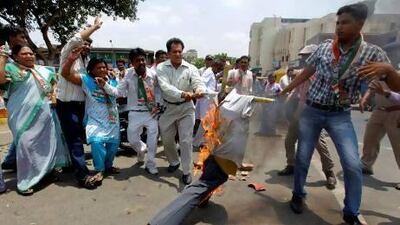NEW DELHI // Recent attacks by Maoists have underlined the need for India to combat terrorism, but debate continues to swirl around the creation of a powerful new anti-terrorist agency.
After the terrorist attacks on Mumbai in 2008 that left 166 people dead, the Indian government promised to set up a National Counter Terrorism Centre (NCTC) that would work within the existing Intelligence Bureau to analyse data, track suspected terrorists and conduct anti-terrorist operations.
Terrorist attacks have continued across the country in the years since, but the NCTC has remained stuck on the drawing board as states squabble over its remit and powers.
The idea of the NCTC is back on the agenda now because of the attack by Maoist guerrillas in the state of Chhattisgarh last month in which 27 Congress party political workers were killed.
But recent talks between the central and state governments have underscored the states' continuing resistance to the NCTC, which they see as encroaching on their power.
Last week, at a government conference on security, the chief ministers of several states shot down attempts to negotiate a compromise over the powers of the NCTC, insisting that law and order falls within the purview of states rather than the centre.
Narendra Modi, chief minister of Gujarat and a leader of the opposition Bharatiya Janata Party (BJP), called the NCTC "just another superstructure in the maze of already existing institutions". He said he feared that the Congress-led government would deploy the NCTC "for political misuse against opposition-ruled states".
Even chief ministers of Congress-ruled states, such as Karnataka and Maharashtra, expressed their reservations about the agency.
India's home minister, Sushilkumar Shinde, acknowledged on Tuesday that his government faced considerable opposition from the states. "We cannot do it alone," Mr Shinde said.
"I have said it many times that both the centre and the states need to work together."
The NCTC was to be vested with the power to conduct searches, seizures and arrests without needing to inform state police forces. That rule was modified last year to force the NCTC to work with and through state police squads.
This proposal, however, drew objections from state chief ministers who say that the NCTC should have no powers of search, seizure and arrest at all.
"What is the use of creating an operation division within the NCTC and giving powers of conducting operations if such operations are to be conducted either through or in conjunction with state police?" Nitish Kumar, the chief minister of Bihar, asked at the security conference.
The United States agency with the same name, upon which the NCTC is based, works only in planning and intelligence and has no operational powers.
Ashok Karnik, a former deputy director of the Intelligence Bureau, said yesterday that although the states' insistence on controlling their own law and order was valid, there were some terrorism-related issues that they were not equipped to handle.
"A state police force cannot track intelligence on Maoists or Pakistan-sponsored terrorists who operate across borders, for example," Mr Karnik said.
Mr Karnik admitted that fears of misuse of the NCTC were well founded, given how the Central Bureau of Investigation - a central government agency that prosecutes corruption cases - has been politicised and used to target members from opposition parties.
"The solution is to ensure that the NCTC acts in coordination with the top police officer in a state," he said.
Like Mr Karnik, Nitin Pai, the director of the Takshashila Institution, a Chennai-based think tank, said that while state governments had some "valid concerns, there is a need for a coherent national institutional mechanism to tackle an international problem".
The fact that the NCTC has not been established in the years since the 2008 Mumbai terrorist attacks, Mr Pai said, suggested that the government "just doesn't have the political talent to put [it] together".
"What was necessary to make this happen was leadership, high statesmanship and political management," Mr Pai said.
"The government couldn't muster this up. So more than a stand-off over technical details and principles, we should see this as political failure."

